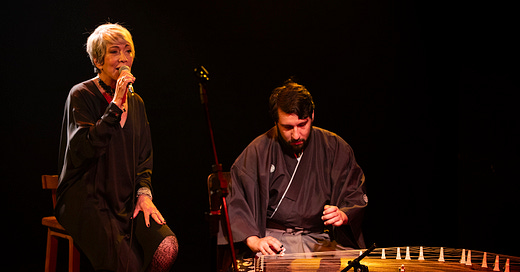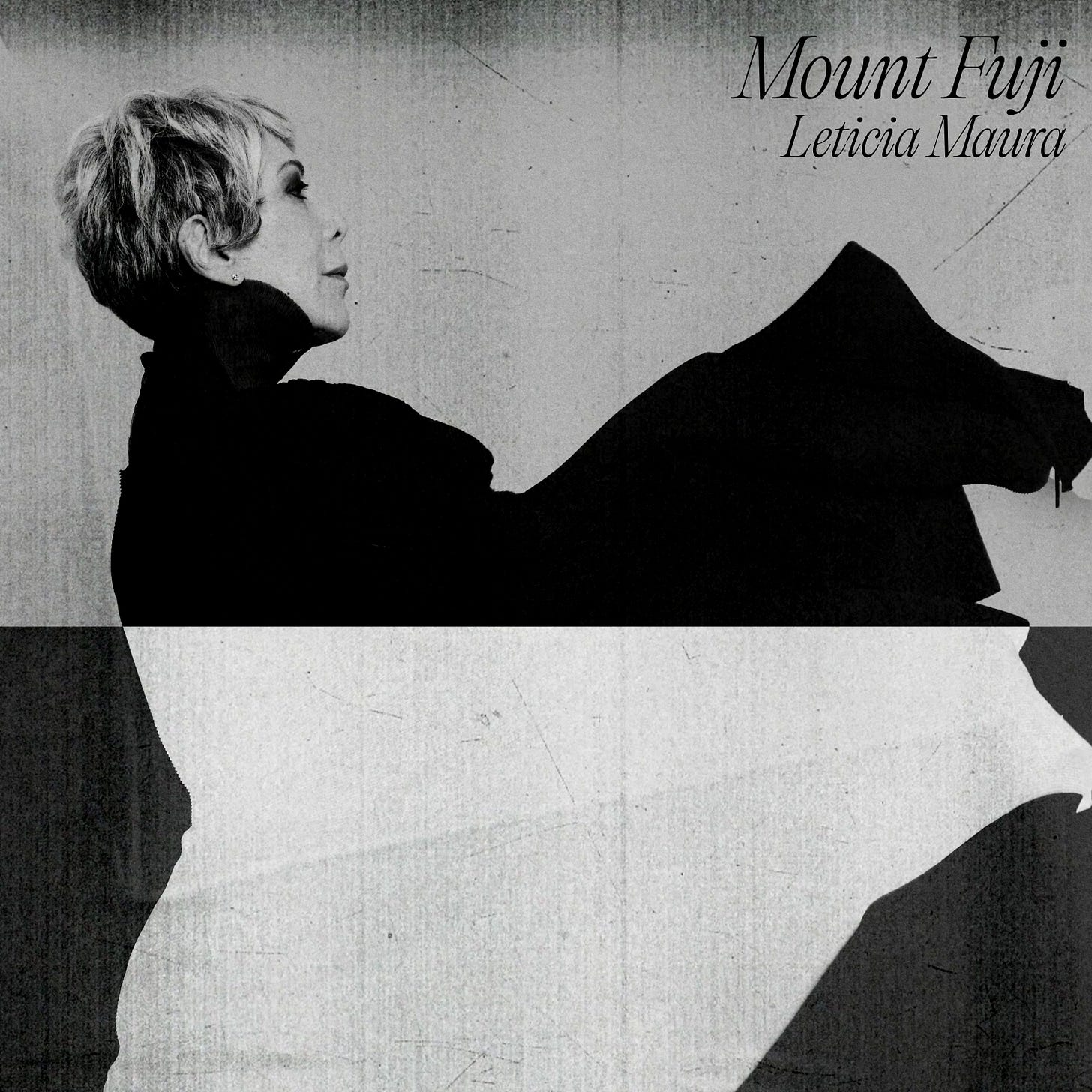Leia em português embaixo
Leticia Maura and Alejandro Barrios performing “Mount Fuji Song” at Theater Centro da Terra, São Paulo (BR) Photo: Stig de Lavor
“In my next life I want to be Japanese”. My friends laughed a lot when it was my turn to say what I would like to be if I were born again. It was a teenage girl's joke, but I was serious.
Japan has always inspired me, made me feel very different emotions from the ones I knew; everything is more delicate, quieter, more spiritual. There is room for the implied, the half-word, the suggested gesture, for everything that isn't obvious.
I soon became interested in literature and the arts, discovered the tea ceremony, kimonos and fell in love with the magnificent Mount Fuji. I started reading Bashō, the master of haiku, and getting emotional listening to koto and shakuhashi bamboo flutes.
So much admiration made me plan a dream trip to the country for years; from Mount Fuji to the thousand-year-old temples and underground night-clubs frequented by manga (comics) fans. With an itinerary ready, good company and, of course, room for the unexpected, everything seemed perfect for the great adventure of my life! I just didn't expect a global pandemic to shatter my plans.
The disappointment was indescribable and I was left crying in the corners of the house, leafing through my book of paintings by Katsushita Hokusai as consolation: I had always loved “36 views of Mount Fuji” (there are actually 46, but that doesn't matter). One night I felt so sad that I decided to write a letter to the mountain.
"Dear Mount Fuji
When my tears evaporate as morning dew, I will see you clearly in your splendid beauty.
When my tears disappear as a bird released, I will run for you with my thrilled feet
When my tears evaporate, I'll climb my dream, drinking drops of wind
Playing koto, I wait to meet you,
when my tears evaporate as morning dew.
Until then I imagine you, crying over paintings of Hokusai".
This is how Mount Fuji Song was born.
When producer and friend Vivian Kuscynski created the arrangement, I asked her to include a koto solo. The “queen” of this ancient string instrument, Tamie Kitahara, introduced me to the master Alejandro Barrios, who recorded the track.
“In my next life I want to be Japanese”. My friends laughed a lot when it was my turn to say what I would like to be if I were born again. It was a teenage girl's joke, but I was serious.
Japan has always inspired me, made me feel very different emotions from the ones I knew; everything is more delicate, quieter, more spiritual. There is room for the implied, the half-word, the suggested gesture, for everything that isn't obvious.
I soon became interested in literature and the arts, discovered the tea ceremony, kimonos and fell in love with the magnificent Mount Fuji. I started reading Bashō, the master of haiku, and getting emotional listening to koto and shakuhashi bamboo flutes.
So much admiration made me plan a dream trip to the country for years; from Mount Fuji to the thousand-year-old temples and little hells frequented by manga fans. With an itinerary ready, good company and, of course, room for the unexpected, everything seemed perfect for the great adventure of my life! I just didn't expect a global pandemic to shatter my plans.
The disappointment was indescribable and I was left crying in the corners of the house, leafing through my book of paintings by Katsushita Hokusai as consolation: I had always loved “36 views of Mount Fuji” (there are actually 46, but that doesn't matter).
One night I felt so sad that I decided to write a letter to the mountain.
"Dear Mount Fuji
When my tears evaporate like the morning dew, I will see you clearly in your splendid beauty.
When my tears disappear like a bird set free, I will run to you with my emotional feet.
When my tears evaporate, I'll climb into my dream, sipping wind drops.
Playing koto, I wait for the day we meet,
when my tears evaporate like the morning dew.
Until then I imagine you, weeping over paintings by Hokusai".
This is how Mount Fuji Song was born.
When producer and friend Vivian created the arrangement, I asked her to include a koto solo - an ancient string instrument. The great lady of the instrument, Tamie Kitahara, introduced me to the master Alejandro Barrios, who recorded the track.
Even if I haven't met him in person yet, Mount Fuji has already made me climb a trail of magical connections, as high as its altitude. Not to mention that, like him, I've always felt like an active volcano, but with no risk of erupting.
Listen Mount Fuji Song here // Ouça a música aqui
Mount Fuji Song
A reverência a um sonho
Photo & Art : Fernanda Pompermeyer
"Na próxima vida quero ser japonesa". Minhas amigas riram muito quando chegou a minha vez de dizer o que gostaria de ser se nascesse de novo. Era uma brincadeira de meninas adolescentes mas eu estava falando sério.
O Japão sempre me inspirou, me fez sentir emoções muito diferentes das que conhecia; tudo mais delicado, mais silencioso, mais espiritual. Há um espaço para o subentendido, a meia-palavra, o gesto sugerido, para tudo o que não é óbvio.
Logo me interessei pela literatura e pelas artes, descobri a cerimônia do chá, os kimonos e me apaixonei pelo magnífico Monte Fuji. Comecei a ler Bashō, o mestre dos haikus, e a me emocionar ouvindo koto e as flautas de bambu shakuhashi.
Tanta admiração me fez planejar por anos uma viagem de sonho ao país; do Monte Fuji aos templos milenares e inferninhos frequentados pelos fãs de mangás (quadrinhos). Roteiro pronto, boa companhia e, é claro, um espaço para o inesperado, tudo parecia perfeito para a grande aventura da minha vida! Só não contava que uma pandemia global despedaçasse os meus planos.
A decepção foi indescritível e fiquei chorando pelos cantos da casa, folheando meu livro de pinturas de Katsushita Hokusai como consolo: sempre amei " 36 vistas do Monte Fuji" (que, na verdade, são 46 mas isso não tem importância).
Uma noite me senti tão triste que resolvi escrever uma carta para a montanha.
"Querido Monte Fuji
Quando minhas lágrimas evaporarem, como o orvalho da manhã, eu o verei claramente em sua esplêndida beleza
Quando minhas lágrimas desaparecerem como um passarinho libertado, eu correrei até você com meus pés emocionados
Quando minhas lágrimas evaporarem, eu escalarei o meu sonho, bebendo gotas de vento
Tocando koto eu espero o dia do nosso encontro, quando minhas lágrimas evaporarem como o orvalho da manhã
Até lá eu o imagino, chorando sobre pinturas de Hokusai".
Foi assim que nasceu Mount Fuji Song.
Quando a produtora e amiga Vivian Kuscynski criou o arranjo, pedi a ela que incluísse um solo de koto. A grande dama desse instrumento milenar de cordas, Tamie Kitahara, apresentou-me ao mestre Alejandro Barrios, que gravou a faixa.
Mesmo se ainda não o encontrei pessoalmente, o Monte Fuji já me fez escalar uma trilha de conexões mágicas, tão elevadas quanto a sua altitude. Sem dizer que, como ele, sempre me senti um vulcão ativo, mas sem risco de entrar em erupção.
@leticiamauramusic






Lovely! You transport us with your song.
Saudade